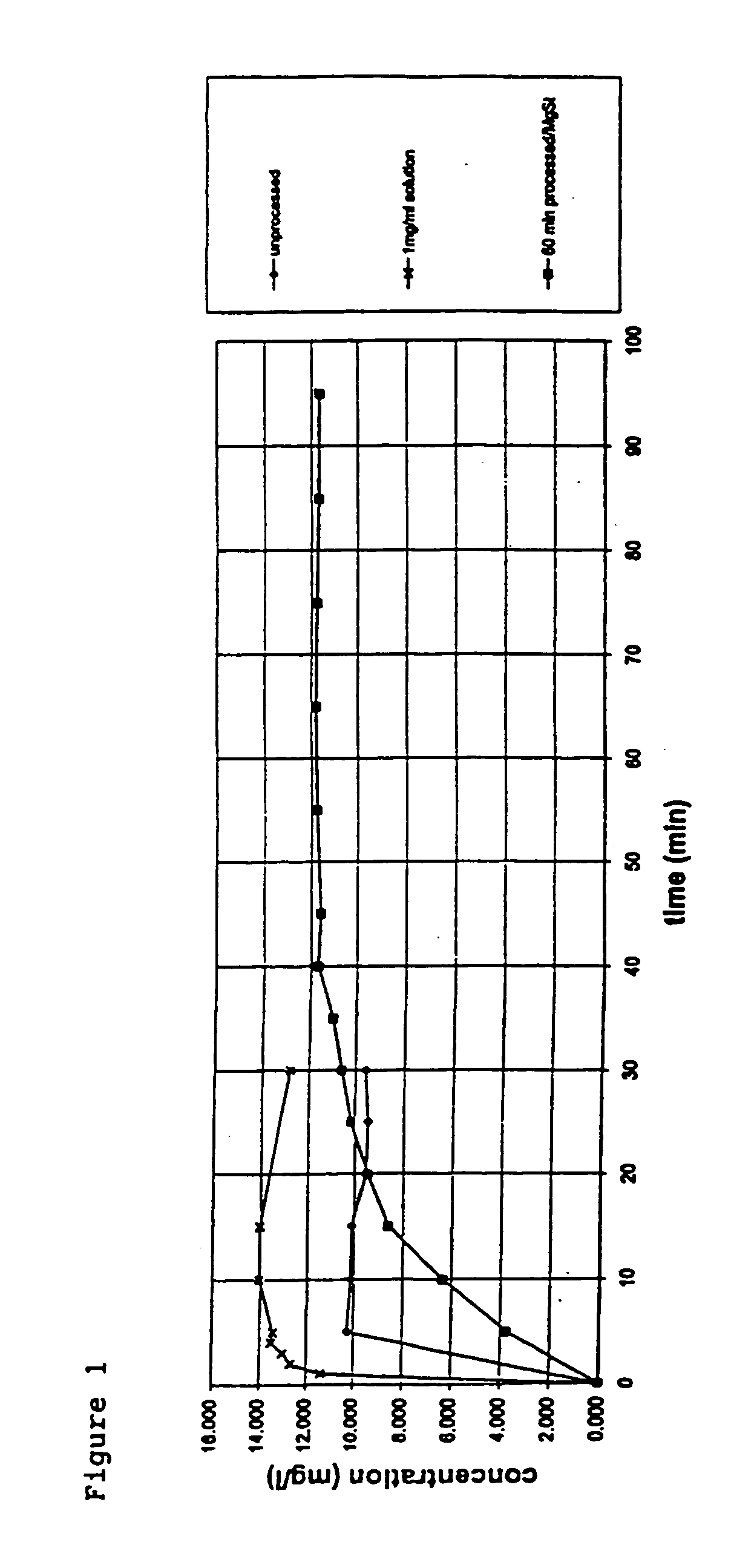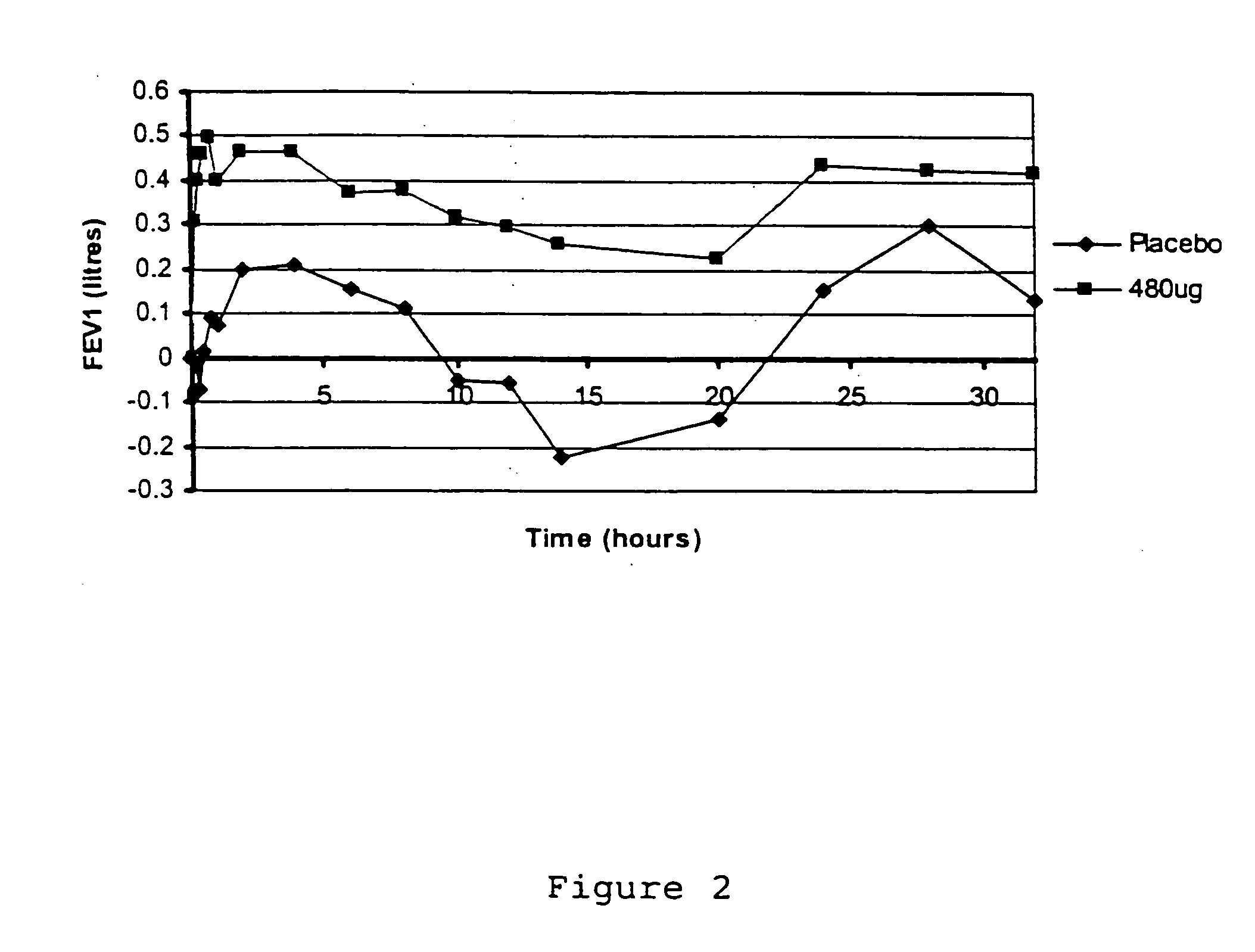Treatment of respiratory diseases
a technology for respiratory diseases and treatment, applied in the field of respiratory diseases, can solve problems such as central and peripheral side effects in patient populations
- Summary
- Abstract
- Description
- Claims
- Application Information
AI Technical Summary
Benefits of technology
Problems solved by technology
Method used
Image
Examples
example 1
[0045] A mixture of micronised glycopyrrolate and magnesium stearate in the ratio 75:25 by mass (total mass of approximately 1 g) was placed in a ball mill on top of 100 g of 2 mm diameter stainless steel balls. The mill volume was approximately 58.8 ml. 5 ml of cyclohexane was added to wet the mixture. The mill was sealed and secured in a Retsch S100 centrifuge. Centrification was then carried out at 500 rpm for 240 minutes in total. Small samples (approximately 5-10 mg) of wet powder were removed from the mill every 60 minutes. The samples were dried in an oven at 37° C. under vacuum, prior to using the samples in a dissolution test.
[0046] The dissolution test was conducted with approximately 1 mg of micronised glycopyrrolate and approximately 1 mg of a ball milled glycopyrrolate / magnesium stearate mixture sampled after 60 minutes. A 195 ml reservoir was used in the dissolution test. The reservoir was filled with water and contained a sampling inlet port and a sampling outlet por...
example 2
[0048] A blend of micronised glycopyrrolate USP and lactose monohydrate (Pharmatose 150M, DMV, Veghel) as carrier was made by simple manual mixing, to give a concentration of 0.48% w / w glycopyrrolate. This was filled into hard gelatin capsules at two nominal fill weights, i.e.12.5 mg to give nominal 60 μg dose, and 25 mg to give a nominal 120 μg dose of glycopyrrolate. For the purpose of blinding, the capsules used were opacified with 2% w / w titanium dioxide (Capsugel Coni-Snap, Size 3, white opaque / white opaque, product code 1505).
[0049] For trials, doses were made up of one or more capsules. Thus, a 480 μg dose was given by using 4 of the 120 μg capsules.
[0050] A placebo was made by filling 25 mg of lactose into capsules. Placebo doses were given as the corresponding number of placebo capsules.
[0051] Six human patients exhibiting obstructive airways disease were administered 4×120 μg capsules in rapid succession via a Miat Monohaler. FEV1 was recorded, using standard spirometri...
PUM
| Property | Measurement | Unit |
|---|---|---|
| diameter | aaaaa | aaaaa |
| time | aaaaa | aaaaa |
| mass median aerodynamic diameter | aaaaa | aaaaa |
Abstract
Description
Claims
Application Information
 Login to View More
Login to View More - R&D
- Intellectual Property
- Life Sciences
- Materials
- Tech Scout
- Unparalleled Data Quality
- Higher Quality Content
- 60% Fewer Hallucinations
Browse by: Latest US Patents, China's latest patents, Technical Efficacy Thesaurus, Application Domain, Technology Topic, Popular Technical Reports.
© 2025 PatSnap. All rights reserved.Legal|Privacy policy|Modern Slavery Act Transparency Statement|Sitemap|About US| Contact US: help@patsnap.com


